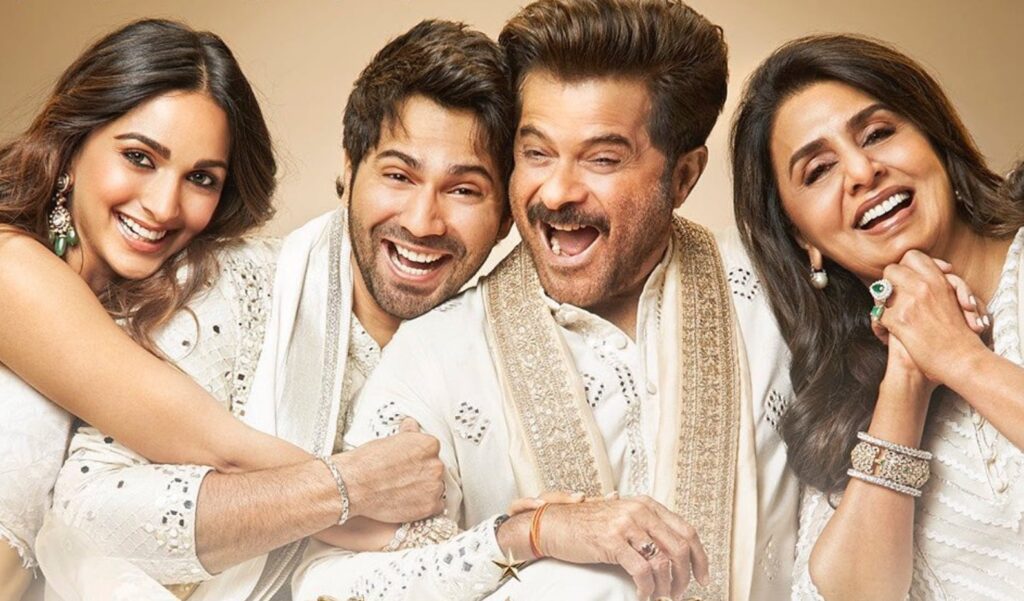Jugjugg Jeeyo, directed by Raj Mehta, looks at the members of the Saini family, who have gathered for the wedding in the family. Even as wedding preparations move on ahead full steam, the family members themselves go through much emotional turmoil, treachery, betrayal and heartache while they try to make some harmonious music in the middle of all the disharmony. Produced by Dharma Productions, the film tells us how love, caring and personal sacrifices can heal even the messiest of relationships.
Jugjugg Jeeyo begins in the late 1990s with Kuldeep Saini aka Kukoo and Nainaa Sharma both studying together in school. As they grow into teenagers and subsequently enter adulthood, their love blossoms resulting in them getting married. They move to Canada due to Nainaa’s better career prospects. As compared to Nainaa, Kukoo’s inferior educational qualifications lead him to get the relatively lowly job of a bouncer. As more and more cracks appear in their five year old marriage, the couple mutually decide to get divorced. But they have to wait since Kukoo’s younger sister, Ginny (Prajakta Koli), is getting married. As Kukoo and Nainaa reach Patiala for the wedding, Kukoo discovers that his father, Bheem (Anil Kapoor), is having an affair with his school teacher, Meera (Tisca Chopra). What’s more to Kukoo’s shock, his father, too, wants a divorce from his mother, Geeta (Neetu Kapoor)…
The film begins interestingly by contrasting the developing romantic relationship between Kukoo and Nainaa, set against the vibrant colours of Punjab, with their marriage breaking up in the the cold, grey and drab atmosphere of Canada. It brings a sense of aesthetic beauty to the film briefly as the locales reflect the relationship of the characters. Pretty soon though, the film settles into the stereotypical terrain of the big fat Punjabi wedding with expensive lifestyles, brightly coloured costumes, heightened emotions and extravagant song and dance. Consequently, it fails to bring any fresh or perceptive view in its approach towards patriarchal mind sets or in its debate between marriage and divorce. Though the film does give a couple of strong, insightful moments to its female characters, it sacrifices any nuances the plot might have had at the altar of a happy and ‘acceptable ending’, where the couples get united despite their differences. This weakens the women who have compromised the most right through their (married) lives and most likely, will continue to having to do so. What’s more, many of the bigger conflicts of the film are explored far too lightly, using a comic tone that minimizes the weightage of the scenes. It’s a pity because the problems that the characters face are highly relatable. But the solutions provided are whimsical and do not help in providing any sort of depth to the characters. Despite ulitizing a band of four writers – Rishhabh Sharma, Anurag Singh, Sumit Batheja and Neeraj Udhwani – the film navigates along a safe and predictable trajectory, duly ticking all the boxes of its formulaic tropes. Perhaps this is so because of all four writers being men.
Thankfully, the performances of the primary cast make the stretched running time of almost two hours and thirty minutes of the film far more endurable. Varun Dhawan as the insecure and uncertain Kukoo fighting his own demons while leaving no stone unturned to bring stability to his family, brings much causal charm to his character. Kiara Advani is in her element as the sophisticated career-centric Nainaa, who at the same time, values Indian traditions and respects elders. It is to her credit that she brings a deeply felt emotional resonance in her performance. Neetu Kapoor (nee Singh) brings much grace and dignity to her characterisation of Geeta. One cannot help but applaud her dexterity in delivering her dialogues that makes us care for her. She stands out in the scene where she drinks a glass of wine with Nainaa and finally releases all the pent-up emotions around her marriage. Debutant Prajakta Koli as Ginny delivers a likeable performance of a young girl caught up in the horns of a dilemma of opting to marry a guy who is affluent or with a lover, who is struggling to be a singer. Manish Paul as a comic character enthrals us with his funny presence. In an attempt to make his character colourful, the choice of his costume is so funky and gaudy that it makes his appearance overblown. Sadly, a fine actress like Tisca Chopra is given the raw end of the stick, both in her screen time and the fleshing out of her role. Finally above all, it’s Anil Kapoor, who carries the film on his shoulders. As the exuberant Bheem, he is wonderful as a man who can be caring, amusing, serious and selfish simultaneously. He effortlessly straddles the different emotions of his character proving yet again what a fine actor he is.
The technicalities are adequate enough be it the cinematography, editing or production design. The background score by John Stewart Eduri effectively maintains the balance between the emotional and hilarious scenes.
Overall, in concentrating mainly on mass entertainment, Jugjugg Jeeyo is a film that is a lost opportunity. It hardly provides any renewed insight on relationships or marriage as an institution and ends up as one of those films that are meant to be ‘enjoyed’ rather than engaged with. And that is where it falls short.
Hindi, Punjabi, Comedy, Drama, Color


